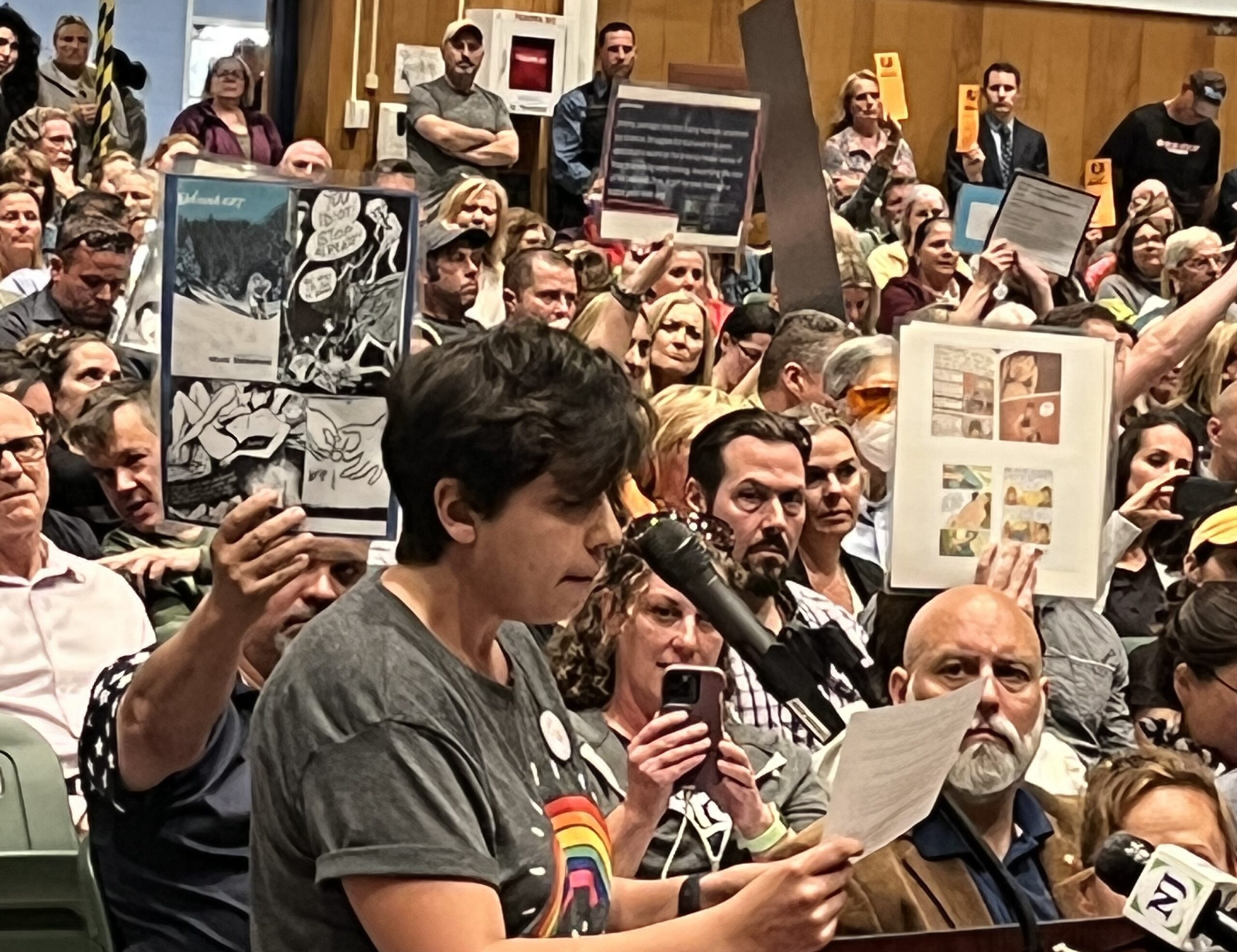
Books are a hot issue these days, prompting heated school board meetings, litigation and pending legislation in Trenton.
With that in mind, robust public discussion is expected – once again – at Tuesday’s meeting of the North Hunterdon Regional school board.
A book called “Let’s Talk About It” is reportedly in the crosshairs – meaning it faces a challenge from those who consider it “porn,” or in the least, unsuitable for high school students.
Backers of keeping the book in the school library point to this description of it:
“How do you find the answers to all the questions you have about yourself, about your identity, and about your body? Let’s Talk About It provides a comprehensive, thoughtful, well-researched graphic novel guide to everything you need to know.
“Covering relationships, friendships, gender, sexuality, anatomy, body image, safe sex, sexting, jealousy, rejection, sex education, and more, Let’s Talk About It is the go-to handbook for every teen, and the first in graphic novel form.”
To be sure, whether a book is appropriate or not for students tends to be a subjective judgement.
However, what may not be subjective is the political appeal of “banning books,” or as practitioners rather say, removing inappropriate books from schools.
As politics plays out throughout New Jersey and the nation, the prevailing thought by many was that those troubled by some books were onto something. Or to be blunt: This has been seen as a good issue for conservative Republicans.
New Jersey Republicans certainly thought so.
“The Democrats are giving us an issue on a silver platter.” That was one of the comments made at a GOP campaign event last fall in Bergen County.
Then came the election. Conservatives did take some school board seats around the state. They lost some too, but in a state with almost 600 school districts, local elections are just about always going to go both ways.
But statewide, Republicans lost six seats in the Assembly. The Senate stayed the same, although Republicans did lose the south Jersey seat held by Ed “the Trucker” Durr, who became a conservative legend when he beat Steve Sweeney in 2021.
Maybe, the GOP failed to make the “porn in school libraries” argument. This was a very low turnout election; less than 30 percent of registered voters took part.
Then again, maybe the book issue doesn’t resonate as far as some think.
Support for that take comes from a just-released Rutgers-Eagleton poll. Here is a key finding:
“When polled in December and asked to choose which concerns them more about schools today, 58 percent of residents say they are more concerned that some schools may ban books
and censor topics that are educationally important, while 35 percent say they are more concerned that some schools may teach books and topics that some students or their parents
feel are inappropriate or offensive; 8 percent are unsure.”
So, by a 23 percent margin, respondents were more worried about book bans than so-called dirty books in school libraries.
As poll director Ashley Koning put it:
“When we assess views in a scientific and representative way, public opinion on this issue shows – like many other topics – that the loudest voices do not necessarily represent the majority.”
One should not expect this poll to silence those “loudest voices.” Nor should it. After all, democracy is about people speaking up and trying to change minds.
However, the poll findings combined with last fall’s statewide election results should not be ignored by school boards as this debate continues.
It also may factor – one supposes – in a pending bill in the Legislature that seeks to give librarians more protection to combat those who want certain books removed.
It also gives a boost to the New Jersey Public Education Coalition, which was formed to combat a “right wing” takeover of school boards.
Mike Gottesman, the coalition founder, observed:
“This is what the coalition has been saying for close to two years. The loud minority ruled the day for two election cycles. However, now that the majority is becoming mobilized, we are sending a message to our legislators that right wing extreme views are rejected. The majority of New Jerseyians believe in freedom of expression and public schools that are free from religious edict and indoctrination.”
(Visited 193 times, 193 visits today)
Book bans have been a hotly debated topic in New Jersey in recent years, with advocates on both sides of the issue passionately defending their positions. The controversy has sparked discussions about censorship, freedom of speech, and the role of schools and libraries in shaping young minds.
Proponents of book bans argue that certain materials are inappropriate for children and should be restricted or removed from school libraries. They often cite concerns about explicit content, violence, or themes that they believe could be harmful or offensive to young readers. Some parents and community members have called for books to be banned based on their personal beliefs or values, leading to challenges and restrictions on a wide range of titles.
On the other side of the debate are those who believe that book bans are a form of censorship that infringes on the rights of readers and restricts access to diverse perspectives and ideas. They argue that children should have the freedom to explore different viewpoints and engage with challenging or controversial material in order to develop critical thinking skills and empathy. Banning books, they say, limits intellectual freedom and stifles creativity.
In New Jersey, the debate over book bans has intensified in recent years as schools and libraries grapple with how to handle challenges to specific titles. In some cases, books have been removed from shelves or restricted in response to complaints from parents or community members. This has sparked outrage among those who believe in the importance of intellectual freedom and the right to access a wide range of literature.
One recent example of this debate occurred in a New Jersey school district where a parent challenged the inclusion of a classic novel in the curriculum due to its depiction of racism. The school ultimately decided to keep the book in the curriculum, but the controversy highlighted the ongoing tensions around book bans and censorship in the state.
As the debate over book bans continues to unfold in New Jersey and across the country, it raises important questions about the role of schools and libraries in promoting literacy, diversity, and intellectual freedom. While it is crucial to consider the concerns of parents and community members, it is also essential to protect the rights of readers to access a wide range of literature and engage with challenging ideas. Ultimately, finding a balance between these competing interests will be key to navigating the complex terrain of book bans in New Jersey.

